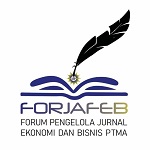ANALISIS HUMAN CAPITAL READINESS DENGAN HUMAN CAPITAL MATURITY MODEL PADA RSUD DR.SOETOMO
(1) Program Studi Pengembangan Sumber Daya Manusia, Sekolah Pascasarjana, Universitas Airlangga
(2) Program Studi Akuntansi, Fakultas Ekonomi dan Bisnis, Universitas Airlangga
(*) Corresponding Author
Abstract
Rumah Sakit Umum Daerah (RSUD) Dr. Soetomo merupakan salah satu rumah sakit di Surabaya yang merupakan rumah sakit rujukan di Indonesia timur. RSUD Dr. Soetomo memiliki program-program yang memberikan nilai tambah lebih bagi pelanggan, karyawan dan masyarakat serta mendukung pertumbuhan ekonomi daerah maupun nasional. Untuk mendukung pelaksanaan program-program strategis tersebut tentunya dibutuhkan kesiapan SDM yang dimiliki oleh RSUD Dr. Soetomo. Penelitian ini bertujuan untuk mengetahui human capital readiness pada RSUD Dr. Soetomo sehingga dapat membuat program strategis yang dibutuhkan untuk mengatasi kesenjangan antara kebutuhan human capital dan ketersediaan human capital. Menggunakan human capital maturity model untuk menentukan tingkat maturity SDM, maka penelitian ini diharapkan dapat memberikan tambahan informasi sebagai bahan pertimbangan dalam perencanaan dan pengambilan keputusan strategis bagi RSUD Dr. Soetomo dan dapat menunjukkan gambaran mengenai sistem pengukuran kinerja SDM dan manfaatnya dalam mencapai tujuan perusahaan.
Keywords
Full Text:
PDFReferences
Barlian, E. (2016). Metodologi Penelitian Kualitatif dan Kuantitatif. Sukabina Press.
Barney, J. (1991). Firm Resources and Sustained Competitive Advantage. Journal of Management, 17(1), 99–120. https://doi.org/10.1177/014920639101700108
Bergheim, S. (2005). Human Capital is the Key to Growth—Success Stories and Policies for 2020. SSRN Electronic Journal, 10(2139/ssrn.774825).
Cerrato, D., & Piva, M. (2012). The internationalization of small and medium-sized enterprises: The effect of family management, human capital, and foreign ownership. Journal of Management & Governance, 16(4), 617–644. https://doi.org/10.1007/s10997-010-9166-x
Chahal, H., Jyoti, J., & Rani, A. (2016). The Effect of Perceived High-performance Human Resource Practices on Business Performance: Role of Organizational Learning. Global Business Review, 17(3_suppl), 107–132. https://doi.org/10.1177/0972150916631193
Curtis, B., Hefley, B., & Miller, S. (2009).
David, F. R., & David, F. R. (2017). Strategic Management: A Competitive Advantage Approach, Concepts (16th ed.). Pearson Education Limited.
Fareed, M., Noor, W. S. W. M., Isa, M. F. M., & Salleh, S. S. M. M. (2016). Developing Human Capital for Sustainable Competitive Advantage: The Roles of Organizational Culture and High-Performance Work System. International Journal of Economic Perspectives, 10(4), 655–673.
Hejazi, R., Ghanbari, M., & Alipour, M. (2016). Intellectual, Human and Structural Capital Effects on Firm Performance as Measured by Tobin’s Q. Knowledge and Process Management, 23(4), 259–273. https://doi.org/10.1002/kpm.1529
Jogaratnam, G. (2017). The effect of market orientation, entrepreneurial orientation and human capital on positional advantage: Evidence from the restaurant industry. International Journal of Hospitality Management, 60, 104–113. https://doi.org/10.1016/j.ijhm.2016.10.002
Kaplan, R. S., & Norton, D. P. (1996). Translating Strategy Into Action The Balanced Scorecard. Harvard Business School Press.
Kaplan, R. S., & Norton, D. P. (2004). Strategy Maps: Converting Intangible Assets Into Tangible Outcomes. Hadvard Business Press.
Khalique, M., Bontis, N., Shaari, J. A. N. B., Yaacob, M. R., & Ngah, R. (2018). Intellectual capital and organizational performance in Malaysian knowledge-intensive SMEs. International Journal of Learning and Intellectual Capital, 15(1), 20–36. https://doi.org/10.1504/ijlic.2018.088345
Lee, Y.-K., Kim, S.-H., Seo, M.-K., & Hight, S. K. (2015). Market orientation and business performance: Evidence from franchising industry. International Journal of Hospitality Management, 44, 28–37. https://doi.org/10.1016/j.ijhm.2014.09.008
Lonial, S. C., & Carter, R. E. (2015). The Impact of Organizational Orientations on Medium and Small Firm Performance: A Resource-Based Perspective. Journal of Small Business Management, 53(1), 94–113. https://doi.org/10.1111/jsbm.12054
Marvel, M. R., Davis, J. L., & Sproul, C. R. (2016). Human Capital and Entrepreneurship Research: A Critical Review and Future Directions. Entrepreneurship Theory and Practice, 40(3), 599–626. https://doi.org/10.1111/etap.12136
Masa’deh, R. E., Al-Henzab, J., Tarhini, A., & Obeidat, B. Y. (2018). The associations among market orientation, technology orientation, entrepreneurial orientation, and organizational performance. Benchmarking: An International Journal, 25(8), 3117–3142. https://doi.org/10.1108/bij-02-2017-0024
Mulyadi. (2009). Sistem Terpadu Pengelolaan Kinerja Personel Berbasis Balanced Scorecard. Cetakan Kedua. Salemba Empat.
Muthuveloo, R., Shanmugam, N., & Teoh, A. P. (2017). The impact of tacit knowledge management on organizational performance: Evidence from Malaysia. Asia Pacific Management Review, 22(4), 192–201. https://doi.org/10.1016/j.apmrv.2017.07.010
Ngah, R., & Ibrahim, A. R. (2011). The Influence of Intellectual Capital on Knowledge Sharing: Small and Medium Enterprises Perspective. Communications of the IBIMA, 1–13. https://doi.org/10.5171/2011.444770
Onkelinx, J., Manolova, T. S., & Edelman, L. F. (2016). The human factor: Investments in employee human capital, productivity, and SME internationalization. Journal of International Management, 22(4), 351–364. https://doi.org/10.1016/j.intman.2016.05.002
Pintea, M.-O., & Achim, M.-V. (2010). Performance-An Evolving Concept. Annals of the University of Craiova (p. 2).
Schultz, T. W. (1961). Investment in Human Capital. The American Economic Review, 51(1), 1–17.
Sugiyono. (2017). Metode penelitian kuantitatif, kualitatif, dan R&D.
Sung, S. Y., & Choi, J. N. (2014). Multiple dimensions of human resource development and organizational performance. Journal of Organizational Behavior, 35(6), 851–870. https://doi.org/10.1002/job.1933
Wang, Y., Bhanugopan, R., & Lockhart, P. (2015). Examining the quantitative determinants of organizational performance: Evidence from China. Measuring Business Excellence, 19(2), 23–41. https://doi.org/10.1108/mbe-05-2014-0014
Article Metrics
Abstract view : 248 timesPDF - 0 times
DOI: https://doi.org/10.26714/vameb.v19i1.11110
Refbacks
- There are currently no refbacks.
Copyright (c) 2023 Value Added : Majalah Ekonomi dan Bisnis
--------------------------------------------------------------------------------------------------------------------------------------------------------------------------------------------
Address:
Department of Management
Faculty of Economics
University of Muhammadiyah Semarang
Kedungmundu Raya Road No. 18, Tembalang, Semarang, Central Java, Indonesia
Contact:
email: [email protected]










